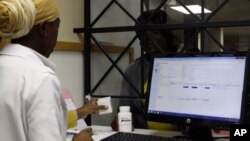South Africa is one of five countries to conduct the first major clinical trial that attempts to prevent heart disease and stroke among HIV-positive patients, who are at higher risk of these conditions.
The Randomized Trial to Prevent Vascular Events in HIV, known as REPRIEVE, is enrolling participants in what is a new front in the war on AIDS, helping those living with the virus to lead long and healthy lives.
The $20-million-a-year, U.S.-funded trial, which is expected to take about six years and take in 6,500 participants, will look beyond the virus.
That’s because as the HIV population ages, doctors are learning that the disease’s relentless attack on the immune system causes other problems, says Dr. Carl Dieffenbach of the U.S. National Institutes of Health.
“What we’re seeing is an increased risk in HIV-positive people, a 50 percent increase in stroke, and a 100 percent increase in cardiovascular, primarily coronary events, heart attacks,” he said. “And women actually have a higher risk than men, which is one of the reasons we’re here... there’s a burden of disease in women in sub-Saharan Africa. And I think this population could be quite useful for us to truly prove that we have this drug that might help them.”
The trial’s design is simple. Participants in the United States, Canada, Thailand, Brazil and South Africa will get one extra pill per day in addition to their normal antiretroviral therapy. That pill will either be a placebo or a statin, a class of drug used to help lower cholesterol levels in the blood, which in turn can help prevent heart attacks and stroke.
During the next six years, trial investigators will monitor the participants closely.
South Africa’s unique health landscape makes it an important participant in the trial. The nation has the world’s highest burden of HIV; about 7 million people are estimated to be infected, according to the U.N. AIDS agency; but, the Heart and Stroke Foundation of South Africa also notes one in three South African adults has high blood pressure, which can cause heart attacks and stroke.
The nation’s health minister has also sounded the alarm over the country's high rate of diabetes and pre-diabetes.
Gita Ramjee, director of the South African Medical Research Council's HIV prevention program, says this study is important not just for individuals, but also the nation’s heavily burdened health system. South Africa has the world’s largest antiretroviral therapy program, with more than three million people receiving treatment.
“In terms of non-communicable diseases in HIV-positive individuals, I think this is a critical study to reduce the burden of noncommunicable diseases, and also to reduce the burden on health systems,” she said.
The ideal study participants are patients between the age of 40 and 75, who have been on antiretroviral medication for at least six months and have low viral loads. Additionally, participants must have only a low to moderate risk of developing heart disease.
In short, Dieffenbach says, the study is seeking otherwise healthy people who happen to have HIV, something he says was unthinkable when he began to study the disease in the early 1990's. Now, he says, he knows of HIV-positive patients in their 70's and 80's who are still living healthy lives.
“Isn’t it a great thing?” he said. “So when I started my career, HIV was a death sentence. And there were no treatments. And through my career, I’ve seen the development of antiretroviral therapy, to fixed-dose combinations of therapy, to one pill, once a day. And now we’re talking about dealing with this question of aging, and aging well and healthily.”
For more information, visit: http://www.reprievetrial.org/




